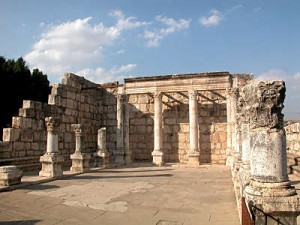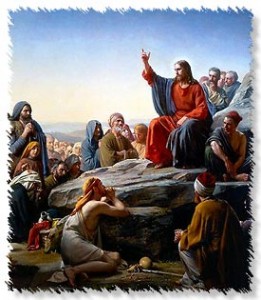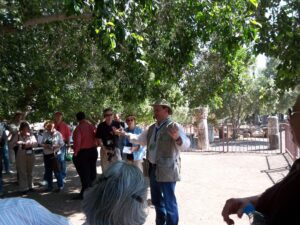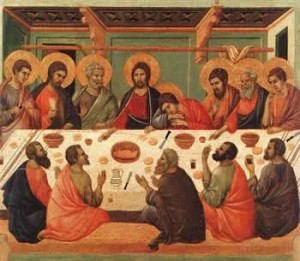Since we are in Capernaum today, I decided to share a few words related to the site. I was recently asked a related questions questionic Answers Live. Capernaum is where Jesus said “Eat My Flesh; Drink My Blood.” I thought it would be appropriate to answer an e-mail I received a while ago from a man named Tim. He asked:

(Picture to left: Remains of synagogue in Capernaum)
All these things spake Jesus unto the multitude in parables; and without a parable spake he not unto them that it might be fulfilled which was spoken by the prophet, saying, I will open my mouth in parables; I will utter things which have been kept secret from the foundation of the world.
He presents this as evidence that when Jesus spoke of us eating his flesh in John 6:54-58, he was speaking metaphorically. He considers that because Jesus was addressing a crowd he must have been using a parable, thus the dogma of the Real Presence is not biblical. Unfortunately my friend chooses not to engage with the host of other arguments (“phago” vs “trogo”; the fact that Jesus’ insistence that His disciples eat His flesh drove them away; etc) and keeps reiterating that the apparent inconsistencies do not matter – all that matters is that the Bible says that Jesus spoke in parables to crowds. How would you answer this argument?”
So I responded:
I will try to answer quickly as you are right, I usually don’t have time to field these questions since I get 100 emails on a good day. But I do strongly suggest you post your question on my Message Board which was set up for this very purpose and you will get plenty of good answers.

Have your friend read the Sermon on the Mount in Matthew chapters 5-7. The other Gospels have shorter versions of this sermon and mention the great crowds that heard him speak. There are many instances when Jesus taught didactically without parables.
In the Protestant New American Commentary, it says “Verse 34b does not refer to Jesus’ teaching beyond this immediate occasion.“ What the commentary means is that it is only in this instance — it is to this specific crowd addressed in Matthew 13 that Jesus only spoke in parables. It does NOT mean that he never spoke to any other crowd without parables. Your friend is very mistaken and has a very poor understanding of Scripture — and seems to lack even a basic understanding of how to interpret it.
Second, what is a parable? According to the Protestant New Bible Dictionary, “a ‘parable’ is the somewhat protracted simile or short descriptive story, usually designed to inculcate a single truth or answer a single question.“
Of course Jesus often spoke metaphorically and of course he often spoke in parables. Parables are stories with a moral attached to them. We are all familiar with parables — stories — Jesus told about the Prodigal Son, the Lost Sheep, the Sower, etc. I would love to ask your friend what “story” or parable is being told in in John 6? Jesus is NOT telling a parable there; he is teaching didactically. Just because he told parables elsewhere does not mean everything and every time he taught it was strictly metaphorical. Your friend is mixing things up — don’t let him get away with it.

(Picture: Steve teaching on the Eucharist and John 6 at Capernaum where Jesus said these things.)
Fourth, and here we will dig in a little bit. The Jews did not believe Jesus that he said they had to eat his flesh an drink his blood. They walked away. If he was speaking metaphorically he would have called them back and said, “Hey guys, you don’t understand — see the Protestants have it right — what I just said is metaphor so you don’t have to be offended and walk away!” But he didn’t — he let the crowd of disciples walk away.
Your friend will also try to use this verse as an argument against you
“It is the Spirit who gives life; the flesh profits nothing; the words that I have spoken to you are spirit and are life.” (John 6:63, NASB95)
He will probably say, “The flesh profits nothing, see!”
Concerning this, Jesus is not speaking about His Flesh (“My Flesh”), in verse 63 but “the flesh” which is very different and which is missed by sloppy-thinking Protestants like your friend. When Protestants claim “My flesh” profits nothing, they prove way too much! They are claiming that the Incarnation of Jesus in the flesh and the bodily resurrection has no profit.
What Jesus means by “”the flesh profits nothing” is very simple because he uses the phrase again in John 8:15 (we must let the Bible interpret the Bible 🙂 where he says:
“You judge according to the flesh; I judge no one.” (John 8:15, NKJV)

This statement of Jesus affirms what he has said about eating his Flesh and drinking his Blood and tells us it is a great mystery — spirit and life. With these words Jesus castigates the unbelieving Protestant along with the unbelieving Jews for judging spiritual things with earthly minds — by the flesh — and failing to understand the deep mysteries of God in the Eucharist.
And by the way, this “symbol only“ mentality about Scripture and this passage in particular is only as old as the Protestant Reformation (er, I mean Rebellion). From the beginning of the Church Christians have understood that Jesus was speaking of his Flesh and Blood in the Eucharist — after all Jesus did not say, “This represents my body.“ he said “This is My Body!“
Too bad your friend wants to erase the words of Jesus or add his own puny interpretation to what the Word of God clearly states. Too bad the mystery goes right over his head.



This Post Has 11 Comments
I am wondering what Jesus meant when he said “the flesh profiteth nothing.”
I’ve heard what it doesn’t mean [that it can’t be speaking of the cross] But what does it mean?
Tim and Sandra, Protestants need help seeing the New Testament Eucharist in light of the Old Testament tabernacle, which they usually know very well. The Eucharist is very well documented there, if you know where to look: the table of the “showbread” as Protestants call it, but it was literally the Bread of the Presence, and God was literally, really, spectacularly present with the people in the tabernacle where this bread was located. All of the elements that speak to the intention of the Eucharist show back up in the New Testament. See (pursuingthesummit@blogspot.com.) If you can connect the two Testaments for them, they will fall like dominoes into the Church.
“the flesh profiteth nothing”: Jesus asks (I paraphrase), “Does this flesh eating offend you, you Jews who were commanded not to eat of the blood of animals as it is the “life” of the animal? You must see with eyes of faith, not flesh! It is the Spirit who gives faith, who also gives spiritual life, this life I am offering you in the Eucharist. The flesh (of mere men, and/or the flesh of Old Testament sacrifices) cannot give you this spiritual life. I AM the bread of this Life…”
Hope this helps!! Pray for our Protestant friends!
Sandra, read the rest of the blog entry where Steve goes into great detail… it means “what I have said cannot be understood with ‘the flesh’ -or- mere human understanding (smells like bread, tastes like bread, looks like bread, ahh, must be bread) it rather requires faith to understand that when He said ‘This IS my Body’ while holding up bread, he really meant ‘This IS my Body’. As I think Augustine said, when Jesus did this, He held His own Flesh in His hands.
That bread of the presence thing pursuingthesummit.blogspot.com is very cool. Didn’t know it.
Thanks abbeynoxious. The reason the tabernacle is so important in converting Protestants is that it was LITERAL, as was everything in it, and would point to literal fulfillments and interpretations by Christ, to then be carried forth by the apostles/Church. As the forerunner of all New Testament things, and the copy of the heavenly tabernacle, the OT tabernacle and its equipment show us how consistently God teaches, and that they were intended to be eternal and permanent (although reinterpreted), not done away with at the coming of Jesus. Fulfillment therefore, does not mean “finished” but reinterpreted to continue on in a new, better form. This is the essence of the letter to the Hebrews in the Bible, and also why, as both Steve and Tom pointed out, it takes faith to see it.
Sorry, all, to post again, but in the interest of full disclosure, “abbeynoxious” turns out to be my very own son who thought it was funny to comment on his mother’s post.
Hahaha… Protestant Rebellion. In my parish library, there is a section entitled “Protestant Rebellion.”
Steve when exactly does it become the Real Presence
STEVE RAY HERE:
Why do you ask me when this info is readily available? I know but it is better for you to study and learn for yourself. I would suggest checking out paragraph 1353 of the Catechism of the Catholic Church.
https://www.facebook.com/groups/1252659441418820/permalink/2933328750018539/
Thanks Steve. I watched a debate on YouTube between a Catholic priest and a protestant pastor about the Eucharist being a real body and blood of Jesus. The Protestant side was quoting scriptures explaining why Jeaus' statement was just metaphorical. The Catholic side in attempt to respond kept saying it's a mystery. It didn't go down well with me until I read this post of yours. It looks like you're directly answering the questions that were raised. God bless you for your deep insight. I have added you to my mentor list after watching a couple of your videos on YouTube. I'm bent on filling my library with materials by you. I read the Bible cover to cover when I was in high school. Now you've challenged me to read it again.
However what I still don't quite understand is the fact that Jesus was standing there with the apostles during the institution of the Eucharist alive, also eating his own flesh. That I might say is a bit awkward. Also does the bread become the living body of Christ, the crucified body of Christ or the dead body of Christ?
STEVE RAY HERE: Thanks Ninson! God bless you. It is not uncomfortable for Jesus to give the disciples his flesh and to eat that himself in the sacramental form. He is the one that said as he ate it — “This is my Body.” Remember, he is the Lamb at the Passover meal and you all have to eat the meat of the lamb, his body. It was the body of the living Lord.
Thanks once again Steve Ray. That really helps.
Comments are closed.